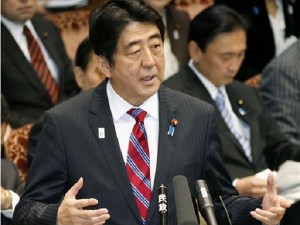BEIJING—China has sharply criticized Japanese Prime Minister Shinzo Abe for telling a US newspaper that Beijing had a “deeply ingrained” need to challenge neighbors over territory, state media said Friday.
Abe, visiting the United States for talks with President Barack Obama, told the Washington Post in an interview published Thursday that China uses disputes with Japan and others to shore up its domestic support.
Tensions between the Asian giants are growing over rival claims to a group of small islands in the East China Sea that the Chinese call the Diaoyus and the Japanese refer to as the Senkakus.
Beijing is also at odds with several Southeast Asian countries, including the Philippines, over islands in the West Philippine Sea (South China Sea).
China’s confrontational stance risked eventually harming its economy and scaring off foreign investors, Abe said.
“Such behavior is going to have an effect on their economic activity at the end of the day,” the paper quoted him as saying.
“In the case of China, teaching patriotism (is equivalent to) teaching anti-Japanese sentiment,” he added.
Beijing fired back, with foreign ministry spokesman Hong Lei saying Chinese officials were “shocked” at the comments, according to the state-run Global Times newspaper.
“It’s rare that a country’s leader would brazenly distort facts, attack its neighbor and instigate confrontation among countries in the region,” it quoted Hong as saying.
China was demanding a clarification and explanation over the comments, he added.
Japan administers the uninhabited islands, though China and Taiwan also claim them. The dispute has simmered for decades but tensions rose last year after Tokyo nationalized those islets in the chain it did not already own.
China responded angrily, with violent street demonstrations damaging Japanese businesses and property, and some Japanese citizens reporting being harassed and physically attacked.
Beijing and Tokyo have both scrambled jets to ward off moves by the other side and fishing boats and government patrol ships have played cat-and-mouse in the vicinity of the islands.
Earlier this month, Tokyo alleged that a Chinese frigate locked its weapons-targeting radar on a Japanese destroyer in what it characterized as a dangerous escalation. Beijing denied the charge.
Abe is due to meet Obama on Friday. Japan and the United States have a security treaty and Washington stations some 47,000 troops in Japan.
Last month Hillary Clinton, approaching the end of her term as secretary of state, said Washington does not take sides in the territorial dispute but pointedly cautioned Beijing not to challenge Japan’s control over the islands.
China’s official Xinhua news agency in a commentary Friday warned the US that backing Tokyo would risk damaging ties with China, urging Washington against “being hijacked” by Japan.
“US support for Japan on the issue would not only damage Washington’s credibility as a constructive superpower, but also as an important partner of China on many pressing global issues”, the commentary said.
US backing would only encourage Japan “to take further provocative actions, which will definitely send China-Japan relations to new lows and even threaten the peace and stability in East Asia”, Xinhua added.
